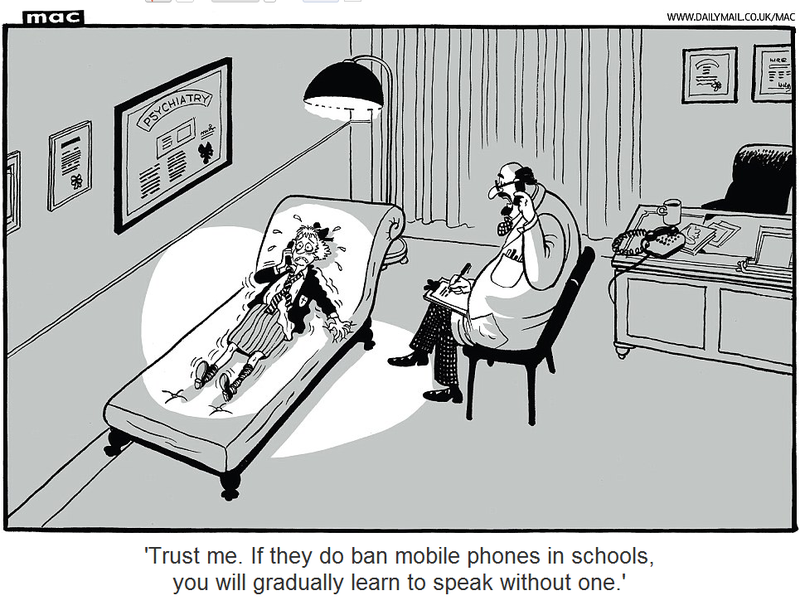While
driving to school the other morning I passed a bus stop wherein six
people where waiting for the bus to arrive, standing only about a
foot or two from each other. Each person was facing away from each
other in an almost circle like pattern. At first I thought the scene
was quite strange until I noticed that every single person standing
there was staring down at a cell phone in their hand. Not only has
the cell phone morphed common human interactions like people waiting
at a bus stop but a new addiction is arising. What’s worse is that
it’s a socially acceptable addiction. More and more people are
becoming dependent on their cell phones each day due to the common
use and daily demand of these mobile devices.
They
even have a word for this rising addiction now. Nomophobia is the
term being used for the rising addiction of cell phone use. It’s
symptoms are strikingly similar to other addictions. Some of the
symptoms include anxiety, insomnia, restlessness, social isolation
and depression. Essentially, if someone’s phone behavior is affecting
their work, social or home life it has crossed over the line into an
addiction. Unlike other addictions, this one is tricker because it is
so readily available and socially acceptable. It is necessary for
most people to have cell phones in order to maintain their jobs and
other functions. Whereas with drugs or gambling you have to
relatively go out of your way to get your fix. I think this addiction
would fall closer to other addictions like food and sex. There is no
way to abstain, so the trick is to learn how to manage the addictive
behavior.
even have a word for this rising addiction now. Nomophobia is the
term being used for the rising addiction of cell phone use. It’s
symptoms are strikingly similar to other addictions. Some of the
symptoms include anxiety, insomnia, restlessness, social isolation
and depression. Essentially, if someone’s phone behavior is affecting
their work, social or home life it has crossed over the line into an
addiction. Unlike other addictions, this one is tricker because it is
so readily available and socially acceptable. It is necessary for
most people to have cell phones in order to maintain their jobs and
other functions. Whereas with drugs or gambling you have to
relatively go out of your way to get your fix. I think this addiction
would fall closer to other addictions like food and sex. There is no
way to abstain, so the trick is to learn how to manage the addictive
behavior.
Some
people may find this amusing and even laughable. This kind of
attitude is one of the driving forces behind this fast growing
addiction. I can’t tell you how many times I have heard people
casually joking about a time they were texting while driving a car or
how they wouldn’t go anywhere without their phones. Because excessive
usage of mobile devices is so common, it is easy for this addiction
to be overlooked, minimized and even to some extent encouraged.
people may find this amusing and even laughable. This kind of
attitude is one of the driving forces behind this fast growing
addiction. I can’t tell you how many times I have heard people
casually joking about a time they were texting while driving a car or
how they wouldn’t go anywhere without their phones. Because excessive
usage of mobile devices is so common, it is easy for this addiction
to be overlooked, minimized and even to some extent encouraged.
As far back as history shows us humans have a driving need to compete
with one another. This is even reminiscent in cell phone use today. I
remember when cell phones started to really take off about ten years
ago. There were actually fake phones coming out for people who
couldn’t afford an actual cell phone so that they could look
important. I think this was an early sign of what was to come. When
we see other people looking busy and in-demand via their cell phones
this fuels us to try and look busy and important on our phones as
well. This example is just one of the ways we create overly
unnecessary use of phones. There is this psychology exercise called
mirroring, in where if one person in a group crosses their legs while
sitting down the others nearby, without realizing it, will soon cross
their legs as well. Humans have a subconscious need to feel included
and excepted. I can’t help but see that this applies in cell phone
use as well. When one person in the group starts using their cell
phone the others start pulling their out as well. No one wants to
feel like the odd man out.
with one another. This is even reminiscent in cell phone use today. I
remember when cell phones started to really take off about ten years
ago. There were actually fake phones coming out for people who
couldn’t afford an actual cell phone so that they could look
important. I think this was an early sign of what was to come. When
we see other people looking busy and in-demand via their cell phones
this fuels us to try and look busy and important on our phones as
well. This example is just one of the ways we create overly
unnecessary use of phones. There is this psychology exercise called
mirroring, in where if one person in a group crosses their legs while
sitting down the others nearby, without realizing it, will soon cross
their legs as well. Humans have a subconscious need to feel included
and excepted. I can’t help but see that this applies in cell phone
use as well. When one person in the group starts using their cell
phone the others start pulling their out as well. No one wants to
feel like the odd man out.
It’s
important to establish and develop healthy boundaries with our cell
phone and not let society under exaggerate the seriousness of this
type of dependency. According to Dr. Sanjay
Dixit, one of the researchers and the head of the Indian Journal of
Community Medicine, people who use their cell phones more than three
hours a day are at a higher risk of developing an addiction to their
cell phone. It’s almost as if it becomes a sort of security blanket
for them. It is also important to note that one out of four phone
addicts have been in some sort of accident while using their phones.
This is due to phone addicts putting their craving’s need over their
own health and safety. I think everyone can benefit in changing
the way we view and use our cell phones as a whole, regardless if
weather we have signs of Nomophoia or not. We have to start with how
we talk about it. Doing small thing like being aware of the amount of
time spent on our cell phones and designating a shut off time will
have a significant impact in developing appropriate cell phone use
behavior and
can help loosen its hold over everyday life.
important to establish and develop healthy boundaries with our cell
phone and not let society under exaggerate the seriousness of this
type of dependency. According to Dr. Sanjay
Dixit, one of the researchers and the head of the Indian Journal of
Community Medicine, people who use their cell phones more than three
hours a day are at a higher risk of developing an addiction to their
cell phone. It’s almost as if it becomes a sort of security blanket
for them. It is also important to note that one out of four phone
addicts have been in some sort of accident while using their phones.
This is due to phone addicts putting their craving’s need over their
own health and safety. I think everyone can benefit in changing
the way we view and use our cell phones as a whole, regardless if
weather we have signs of Nomophoia or not. We have to start with how
we talk about it. Doing small thing like being aware of the amount of
time spent on our cell phones and designating a shut off time will
have a significant impact in developing appropriate cell phone use
behavior and
can help loosen its hold over everyday life.
I wrote this for my college english class this year for an informative essay assignment(without the pictures). My instructor encouraged me to post some of my essays and so I decided It might be thought provoking and worth sharing with you EMI readers. I have become more and more dependent on my cell phone over the past few years and this assignment couldn’t come at a better time for me. I learned so much doing the research for this paper and it really helped me understand the gravity of establishing healthy boundaries not just with cellphones but other seemingly harmless addictions as well.


